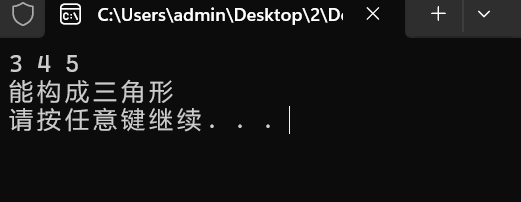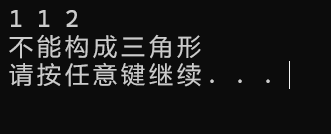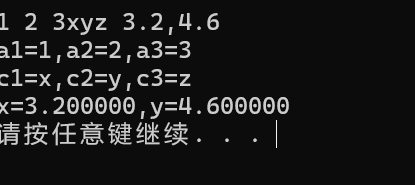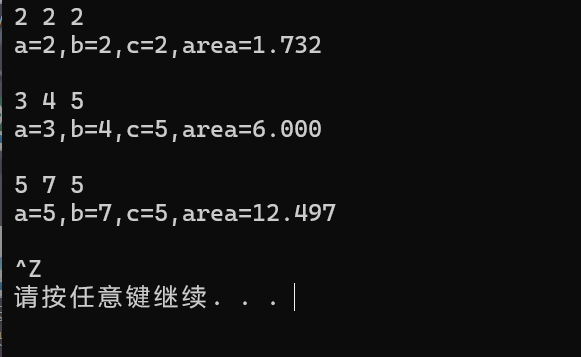实验1 C语言输入输出和简单程序编写
实验1:
源代码1:
#include<stdio.h> #include<stdlib.h> int main() { printf(" O\v"); printf("<H>\v"); printf("I I\v"); printf(" O\v"); printf("<H>\v"); printf("I I\v"); system("pause"); return 0; }
截图2:

源代码2:
1 #include<stdio.h> 2 #include<stdlib.h> 3 int main() 4 { 5 printf(" O\t"); 6 printf(" O\n"); 7 printf("<H>\t"); 8 printf("<H>\n"); 9 printf("I I\t"); 10 printf("I I\n"); 11 system("pause"); 12 return 0; 13 }
截图2:

实验2:
源代码:
1 #include<stdio.h> 2 #include<stdlib.h> 3 int main() 4 { 5 double a,b,c; 6 scanf("%lf%lf%lf",&a,&b,&c); 7 if(a+b>c&&a+c>b&&b+c>a) 8 printf("能构成三角形\n"); 9 else 10 printf("不能构成三角形\n"); 11 system("pause"); 12 return 0; 13 }
截图:



实验3:
源代码:
1 #include<stdio.h> 2 #include<stdlib.h> 3 int main() 4 { 5 char ans1,ans2; 6 printf("每次课前认真预习、课后及时复习了没?(输入y或Y表示有,输入n或N表示没有):"); 7 ans1=getchar(); 8 getchar(); 9 printf("\n动手敲代码实践了没?(输入y或Y表示敲了,输入n或N表示木有敲):"); 10 ans2=getchar(); 11 if((ans1=='y'||ans1=='Y')&&(ans2=='y'||ans2=='Y')) 12 printf("\n罗马不是一天建成的,继续保持哦:)\n"); 13 else 14 printf("\n罗马不是一天毁灭的,我们来建设吧\n"); 15 system("pause"); 16 return 0; 17 }
截图:




删除getchar();的后果:
:
getchar();的作用:
存放换行符
实验4:
源代码:
1 #include<stdio.h> 2 #include<stdlib.h> 3 int main() 4 { 5 double x,y; 6 char c1,c2,c3; 7 int a1,a2,a3; 8 scanf("%d%d%d",&a1,&a2,&a3); /*a1,a2,a3前没加&*/ 9 printf("a1=%d,a2=%d,a3=%d\n",a1,a2,a3); 10 scanf("%c%c%c",&c1,&c2,&c3); 11 printf("c1=%c,c2=%c,c3=%c\n",c1,c2,c3); 12 scanf("%lf,%lf",&x,&y); /*double型数据要用%lf而不是%f*/ 13 printf("x=%lf,y=%lf\n",x,y); /*double型数据要用%lf而不是%f*/ 14 system("pause"); 15 return 0; 16 }
截图:

实验5:
源代码:
1 #include<stdio.h> 2 #include<stdlib.h> 3 int main() 4 { 5 double year; 6 year=1000000000.0/3600.0/24.0/365.0; 7 printf("10亿秒约等于%.0lf年\n",year); 8 system("pause"); 9 return 0; 10 }
截图:

实验6:
源代码:
1 #include<stdio.h> 2 #include<stdlib.h> 3 #include<math.h> 4 int main() 5 { 6 double x,ans; 7 while(scanf("%lf",&x)!= EOF) 8 { 9 ans=pow(x,365); 10 printf("%.2f的365次方:%.2f\n",x,ans); 11 printf("\n"); 12 } 13 system("pause"); 14 return 0; 15 }
截图:

实验7:
源代码:
1 #include<stdio.h> 2 #include<stdlib.h> 3 int main() 4 { 5 double c,f; 6 while(scanf("%lf",&c)!=EOF) 7 { 8 f=c/5*9+32; 9 printf("摄氏度c=%.2lf时,华氏度f=%.2lf\n\n",c,f); 10 } 11 system("pause"); 12 return 0; 13 }
截图:

实验8:
源代码:
1 #include<stdio.h> 2 #include<stdlib.h> 3 #include<math.h> 4 int main() 5 { 6 double area,a,b,c,s; 7 while(scanf("%lf%lf%lf",&a,&b,&c)!=EOF) 8 { 9 s=(a+b+c)/2; 10 area=sqrt(s*(s-a)*(s-b)*(s-c)); 11 printf("a=%.0lf,b=%.0lf,c=%.0lf,area=%.3lf\n",a,b,c,area); 12 printf("\n"); 13 } 14 system("pause"); 15 return 0; 16 }
截图:

实验结论:
1.在用scanf()函数输入浮点数时,不要在格式控制中指定小数部分的位数,否则编译时会报错。例如scanf("%5.2f,",&f),编译器会报告错误
2.printf()函数里面不用加&,否则输出的是存储地址,scanf()里才要加
3.分隔符空格会被读入并赋给%c,但scanf("%d%d%d",a,b,c)可以用空格,但如果是scanf("%d,%d,%d",a,b,c)需用逗号(,)分开,否则会报错
4.ctrl+z后要按回车才能退出循环
5.&&的优先级>||,这会导致如ans1=='y'||ans1='Y'&&ans2=='y'||ans2=='Y'的中间部分ans1='Y'&&ans2=='y'被看成一个式子,所以要加()


 浙公网安备 33010602011771号
浙公网安备 33010602011771号